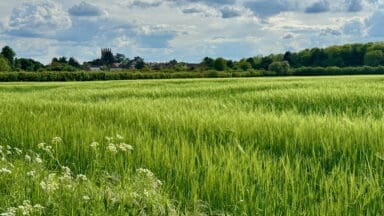
Earlier this week, the government opened a consultation on proposals to streamline the “complex planning rules” and ease “onerous regulatory burdens” on building in order to deliver their quote of 1.5 million new homes by 2030. The difficulty of achieving the ambitious house-building target has brought the impact of Biodiversity Net Gain (BNG) into focus. BNG became mandatory in February as part of the 2021 Environment Act and requires housing developers to delivering a 10% net improvement in biodiversity over a 30-year period.
In order to speed up house-building on smaller sites, the Housing Secretary and Deputy Prime Minister, Angela Rayner is proposing reduced Biodiversity Net Gain (BNG) requirements for minor developments of up to nine houses, and plans to give powers to planning officers for approval – rather than councillors. Developments with 10 to 49 homes will fall under a new ‘medium site’ category and also be subject to simplified BNG rules, which currently require a minimum 10% habitat improvement.
According to the government, smaller firms had seen their market share reduce dramatically since the 1980s, when small- and medium-sized builders delivered 40% of the country’s homes, and that the new changes would “level the playing field”. The Home Builders Federation agreed, saying that BNG had placed a “disproportionate burden on small and medium-sized home builders”.
However, the Wildlife and Countryside Link warned that under the new proposals, 70% of housing developments would no longer need to compensate for nature loss and allows developers to break up large projects into smaller ones to avoid the rules. CEO Richard Benwell said: “These changes could leave the BNG system dead in the water and, with it, the government’s main guarantee of nature-positive planning. BNG is there to ensure that local communities aren’t robbed of the green spaces that make places better to live in, and that developers can’t take from nature without giving something back. This should be the rule, not the exception. Government shouldn’t turn back the clock to the days of damaging development, but ensure a level playing field for all developers to contribute to growth and nature restoration.”
The Office for Environmental Protection (OEP) has written to the UK government warning that its Planning and Infrastructure Bill could weaken protections for nature. Dame Glenys Stacey, Chair of the OEP, put forward their concerns that the new proposals undermine the potential of BNG to deliver intended “win-win outcomes”. Stacey said: “There are fewer protections for nature written into the bill than under existing law. Creating new flexibility without sufficient legal safeguards could see environmental outcomes lessened over time. Aiming to improve environmental outcomes overall, whilst laudable, is not the same as maintaining in law high levels of protection for specific habitats and species. In our considered view, the bill would have the effect of reducing the level of environmental protection provided for by existing environmental law. As drafted, the provisions are a regression.”
There is little doubt that new housing and infrastructure is needed, but it is equally important that the planning reform needed to deliver the new housing does not come at the expense of the natural environment.

